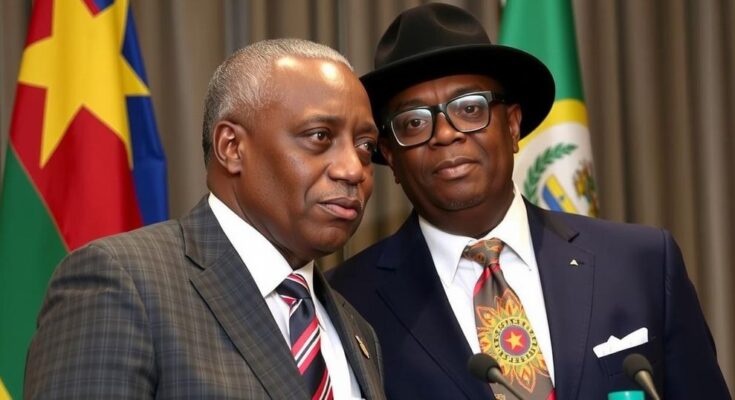The peace summit between Rwanda and the DRC mediated by Angola has been cancelled amid deadlock, particularly regarding a Rwandan demand for direct dialogue with M23 rebels. The situation remains critical as conflict escalates, displacing millions and creating a significant humanitarian crisis in the region.
The peace negotiations between Rwanda and the Democratic Republic of the Congo (DRC) aimed at resolving the ongoing conflict in the eastern DRC have been abruptly cancelled by the Angolan presidency, which has been mediating the discussions. According to Angolan media officer Mario Jorge, the expected summit did not convene as planned, although the reasons for its last-minute cancellation were not disclosed.
Angolan President Joao Lourenco, in his role as an African Union mediator, had preliminary discussions with DRC President Felix Tshisekedi; however, Rwandan President Paul Kagame’s presence at the meeting remained uncertain. The talks had encountered significant roadblocks due to a demand from Rwanda that the DRC engage directly with the M23 rebel group, who are implicated in the escalation of violence in the region.
Earlier in the week, tensions flared again with accusations from the DRC army against the M23 regarding the deaths of 12 civilians in North Kivu, claims which the M23 refuted as mere propaganda. This region has become a battleground for numerous armed factions vying for control over its rich mineral resources, contributing to one of the largest humanitarian crises in the world that has displaced over seven million people.
Despite denying involvement with the M23, Rwanda acknowledged its military presence in eastern DRC, citing security concerns due to the DRC armies gathering near its borders. A recent UN report suggests that thousands of Rwandan Defence Force members are actively engaged alongside M23 fighters. Although a ceasefire was established in July, violations persist, leading the U.S. to express grave concern over the situation. Residents like Aline Kasereka in Lubero have noted the dire need for peace negotiations to restore stability and safety alongside the pressing humanitarian situation. Furthermore, a lingering sense of uncertainty prevails among the affected population, exacerbating their suffering.
The political landscape in the eastern DRC has been marred by conflict exacerbated by the activities of the M23 rebel group, which the DRC government and the UN allege receives support from Rwanda. This has escalated tensions not only between the DRC and Rwanda but also among various armed groups competing for territorial control in resource-rich areas. The humanitarian fallout from this conflict has been immense, leading to significant displacement and suffering for millions. Efforts made towards peace talks have been critical but face challenges, including unresolved demands and accusations of violence. The broader implications of these negotiations extend beyond immediate conflict resolution to regional stability and humanitarian relief.
In conclusion, the cessation of peace talks between Rwanda and the DRC represents a significant setback in efforts to address the ongoing conflict in eastern DRC. The deadlock surrounding Rwanda’s demand for direct negotiations with the M23 rebels highlights the complex nature of the situation. Tensions continue to rise as violence persists in the region, and the humanitarian crisis deepens, necessitating urgent diplomatic efforts to find a resolution that addresses both security concerns and the humanitarian plight of displaced individuals.
Original Source: www.aljazeera.com




